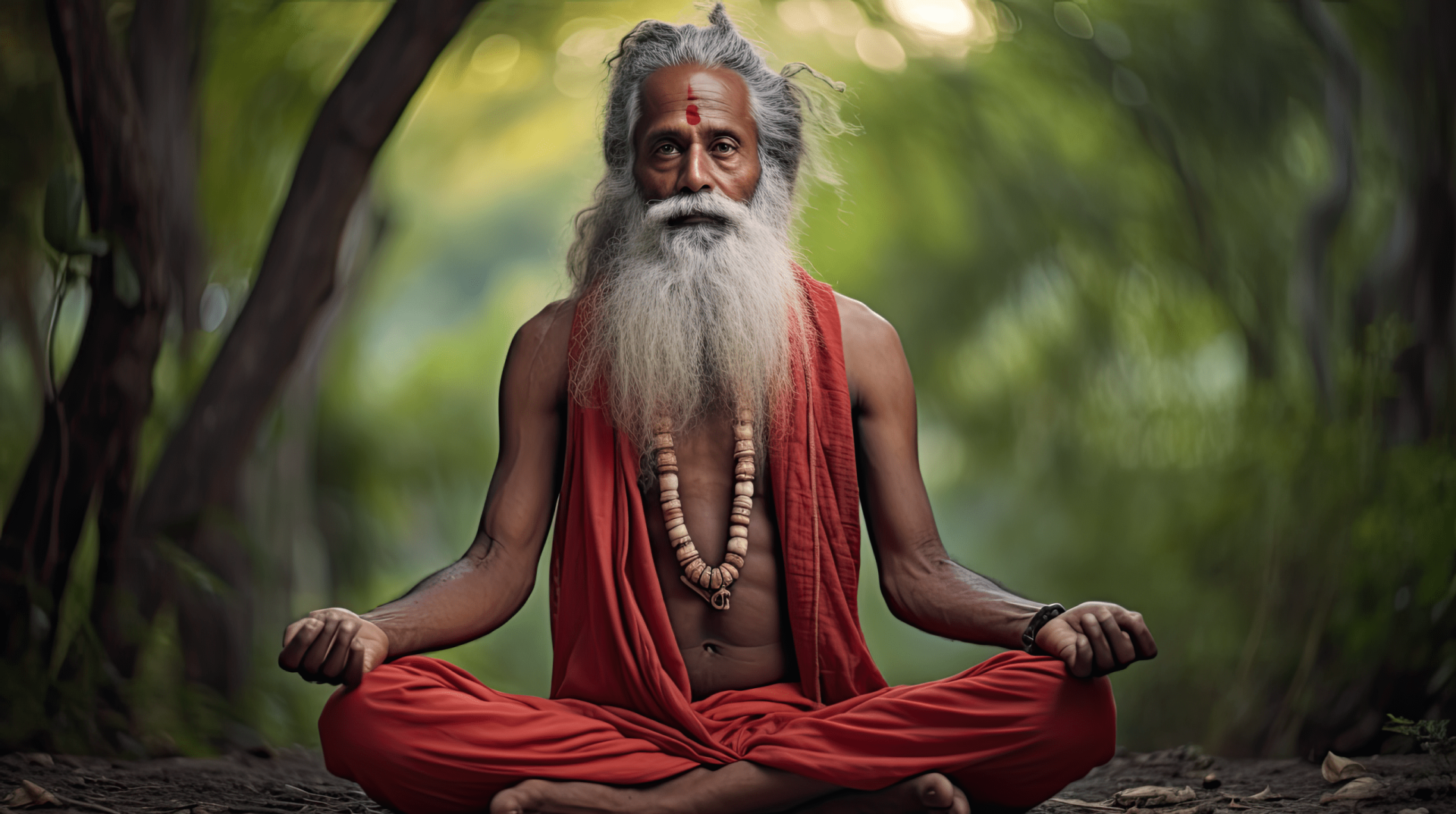by Pandit Usharbudh Arya
(now Swami Veda Bharati)
Renunciation is the complete forgetting of “I” and “Mine”. It is that mode of thought and experience in which the whole of creation becomes yourself. One who has taken the vow of renunciation, and thus becomes a swami, considers himself a member of every family on earth, having as his first concern their physical and spiritual well-being. He is as concerned for them as novices in the practice of love, leading a limited worldly life, are concerned for their own families. A renunciant claims to have an intimate relationship with everything, but is not attached to anyone or anything. “Attachment to no one” means that he demands nothing from anyone, wants and seeks nothing from anyone, needs no emotional support from anyone, but offers support and encouragement to all. Like the rising sun wearing orange/saffron clothes, he must distribute light to every nook and cranny of the world. Wherever he finds him in the evening there is his home, under someone’s roof or under God’s free sky. Free and ever moving, like the breeze, he gives breath of life to all. Flowing like a river, he soothes, purifies and irrigates everything. Like a fire he purifies everything. Like a light he illuminates everything. Like the sky, he remains untouched, serene, calm, giving space to everyone; he invites every being to find rest, solace, help and support.
A candidate to become a swami is bathed in the Ganges, the holy river, and gives up all clothes. Then the guru gives him new clothes. Mentally he/she must be the same as Adam or Eve before the fall, without gender, for him/her there is no longer a physical body in the identification of the personal self. However, he/she must continue to take good care of the physical vehicle so that he/she can serve others as best he can. Since he/she owns nothing of his/her own (svam), he/she is called swami, the master of all, because he/she has become a master over his/her own will.
On taking the swami oath, he declares “a-bhyam” to all living beings: I am no threat to anyone, I am no danger to anyone; let no living being henceforth fear me. In a great fire ritual, he names each and every one of his/her organs, his/her sensory faculties, prana, mental states and functions and pours a libation of ghee (clarified butter) into the fire, as if offering his/her own faculties to the universal fire. He declares of each of them, “They are no longer mine”; “free from any kind of “dust” I have collected so far, I am now sinless; I am light.”
After that, if he holds anything it is only formally in his name, as an advantage for his universal mission of service and love which he freely gives and distributes without reserve. He must avoid all honor and recognition, unless it would help his service to the world. He must do, speak, think, wear, eat whatever may help those he serves.
He can renounce any stage of life whenever his universal love crosses the prescribed boundaries. Renunciation is certainly not an abandonment of any kind of obligation. Those who have claims on him must first renounce their claims on him and give him their happy permission to be free. This choice of theirs is not an act of renunciation, for they have yet to contend with the world. He renounces because his karma with them has been fulfilled; all he leaves behind are their happy thoughts of him. There are cases in history where someone became a swami by telling a lie such as that he had no relatives or that he had obtained their permission to become a swami. After it was found to be untrue, such people were expelled from the monastic order and sent to perform their worldly duties.
In some cases, a renouncing guru may order that he continue to perform some residual duties to his family, for example, continue to finance the education of a child. The great Shankara returned to his dying mother and performed her last rites. Why should a renunciant not perform these duties that he would normally perform for any member of his universal family, without pretensions or attachments and free from any emotions. He refers to his pre-renunciation family as purvashram: “relations from my previous ashram”. [previous stage of life]
Therefore, the act of renunciation is not an escape, nor a divorce. Just as someone who takes vows as a Catholic nun and changes her name, she does not meet with the condemnation of her parents, only increasing the scope of her love, so it is with someone who becomes a Swami during marriage. The husband/wife of such a person considers himself/herself married, but does not demand anything from the Swami, because his/her person is now sacred, beyond the body and beyond touch. Parents, husband, wife, children who have left their child, their spouse and their father or mother, are to be admired for their renunciation, so that one can save the whole world by being free.
In Indian Law the act of becoming Sanyasa, or becoming a swami, is considered as a civil death. For example, any property acquired after one has become a Swami passes to his disciples, on the death of the Swami, and not to the biological children (from the previous ashram) [stage of life].
Swami Rama says that human beings are an unfinished product. A Swami is the finished product, ideally speaking; or who aspires to become a finished product soon, in this life; this is the end in human evolution. He has no specific name, no birthplace, no caste, no social group, no religion, no country. He is a citizen of the whole earth, the nearest relative to whom anyone can confess anything. He is a kind of shower when one suffers from a lack of love.
In the life of a spiritual seeker or teacher, there comes a time when a decision can no longer be postponed. He goes through emotions like those of a bride: sadness at separation from a past lover, looking forward to a future with a different expansion of love. All weak emotions must be reviewed and conquered – not by suppressing them, but by immersing the small love in a greater one. The Swami simply knows, at some point in life, that the pressing business details of worldly life will never end – while billions die without light. He ties up as many loose ends as possible, and emerges carrying a torch into the night. At that moment of decision, nothing is heavy enough to bind him. The call to go (to become a Pari-vrajaka) has come: for the benefit of many bahu-jana-hitaya, for the comfort of many baha-jana-sukhaya, as the Buddha said when he exhorted and sent his first batch of monks into the world. At that moment, physical discomfort and mental sorrow become as unimportant as ignoring the need of a mother to get a full sleep when her child is suffering from fever.
Such a moment is the moment of death; death to one’s limited self. The renouncer performs that ceremony of his own which is normally performed by relatives after one’s funeral. Swami Rama tells the story of a man in a certain town in India. Every astrologer in the town predicted that he would die on a certain morning. In the evening, before the predicted date of this man’s death, Shri Swamiji arrived in the town and went to see him. This dialogue followed:
He: Swamiji, every astrologer in the city predicts that I will die tomorrow.
Swamiji: Do you want to live on?
He: Yes, of course.
Swamiji: Then give up worldly life and become a Swami tomorrow morning; you are dying to your previous world.
He: Oh, but what will my wife say?
Swamiji: What will she say, if you die in the morning?
The Lord went home, took his wife’s permission, became a Swami, and lived on.
On the day when someone is meant to become a swami, if he decides not to give up but to continue clinging to physical death he is bound to be grabbed by the hair, because his work for the “previous ashram” is already done.
Intense sadhana; the realization of universal love; the satisfaction derived from seeing the ignorance of others and the consequent suffering reduced; and the unlimited grace of the guru; these help a novice renouncer to walk firmly and not to waver.
As for the welfare of the renouncer, besides the grace of the guru, the whole world looks after him with love. Those above him bless him, those below him are ever grateful. How wonderful is the life of a renouncer, the life of an all-encompassing, incorruptible sky.
Reach heaven, friends!

